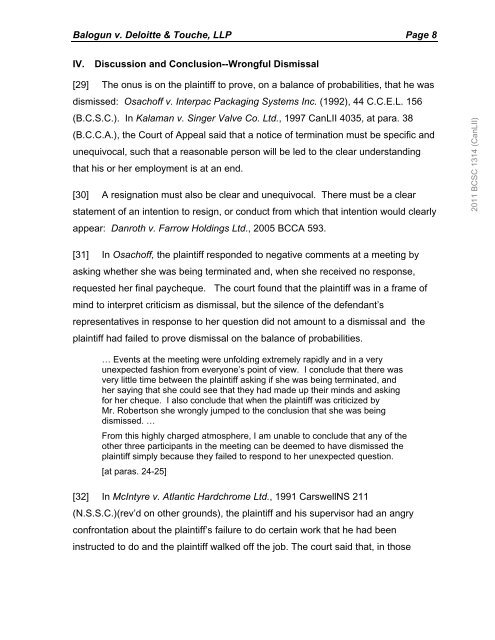FAQ's Cases - Stewart McKelvey
FAQ's Cases - Stewart McKelvey
FAQ's Cases - Stewart McKelvey
- No tags were found...
You also want an ePaper? Increase the reach of your titles
YUMPU automatically turns print PDFs into web optimized ePapers that Google loves.
Balogun v. Deloitte & Touche, LLP Page 8IV. Discussion and Conclusion--Wrongful Dismissal[29] The onus is on the plaintiff to prove, on a balance of probabilities, that he wasdismissed: Osachoff v. Interpac Packaging Systems Inc. (1992), 44 C.C.E.L. 156(B.C.S.C.). In Kalaman v. Singer Valve Co. Ltd., 1997 CanLII 4035, at para. 38(B.C.C.A.), the Court of Appeal said that a notice of termination must be specific andunequivocal, such that a reasonable person will be led to the clear understandingthat his or her employment is at an end.[30] A resignation must also be clear and unequivocal. There must be a clearstatement of an intention to resign, or conduct from which that intention would clearlyappear: Danroth v. Farrow Holdings Ltd., 2005 BCCA 593.2011 BCSC 1314 (CanLII)[31] In Osachoff, the plaintiff responded to negative comments at a meeting byasking whether she was being terminated and, when she received no response,requested her final paycheque. The court found that the plaintiff was in a frame ofmind to interpret criticism as dismissal, but the silence of the defendant’srepresentatives in response to her question did not amount to a dismissal and theplaintiff had failed to prove dismissal on the balance of probabilities.… Events at the meeting were unfolding extremely rapidly and in a veryunexpected fashion from everyone’s point of view. I conclude that there wasvery little time between the plaintiff asking if she was being terminated, andher saying that she could see that they had made up their minds and askingfor her cheque. I also conclude that when the plaintiff was criticized byMr. Robertson she wrongly jumped to the conclusion that she was beingdismissed. …From this highly charged atmosphere, I am unable to conclude that any of theother three participants in the meeting can be deemed to have dismissed theplaintiff simply because they failed to respond to her unexpected question.[at paras. 24-25][32] In McIntyre v. Atlantic Hardchrome Ltd., 1991 CarswellNS 211(N.S.S.C.)(rev’d on other grounds), the plaintiff and his supervisor had an angryconfrontation about the plaintiff’s failure to do certain work that he had beeninstructed to do and the plaintiff walked off the job. The court said that, in those
















